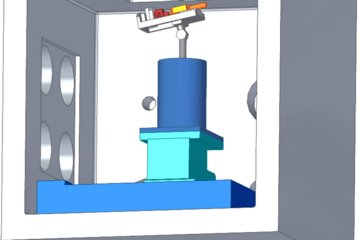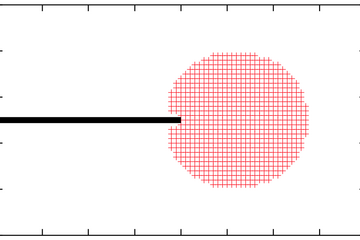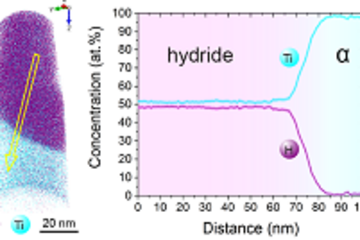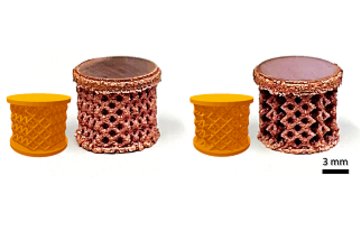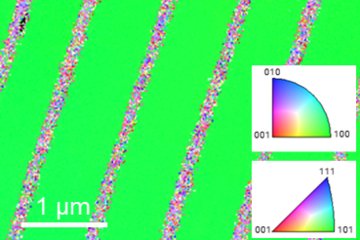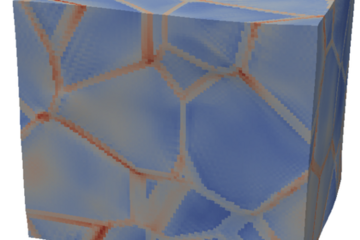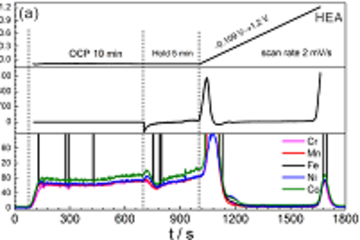All genres
221.
Talk
Rational design of morphological pattern for efficient electrocatalytic gas evolution. 4th Regional Symposium on Electrochemistry South-East Europe, Ljubljana, Slovenia (2013)
222.
Talk
Investigation of electrode material durability for electrochemical energy conversion. Materials Research Society - 2012 MRS Fall Meeting, Boston, MA, USA (2012)
223.
Talk
Investigations of fuel cell electrocatalyst degradation – A fundamental perspective. Seminar lecture at Norwegian University of Science and Technology, Trondheim, Norway (2012)
224.
Talk
Scanning Flow Cell System for Fully Automated Screening of Electrocatalyst Materials. Seminar lecture at Danish University of Technology, Copenhagen, Denmark (2012)
225.
Talk
Corrosion and Dealloying of Crystallized Amorphous Steel. Pacific Rim Meetin on Electrochemical and Solid-State Science PRIME 2012 / ECS 222, Honolulu, HI, USA (2012)
226.
Talk
Anaerobic Microbial Influenced Corrosion. EUROCORR 2012, Istanbul, Turkey (2012)
227.
Talk
Electrochemistry of H2O2 on platinum: Towards understadning ORR. Electrochemistry 2012 - Fundamental and Engineering Needs for Sustainable Development (GDCh Meeting), München, Germany (2012)
228.
Talk
Herausforderungen der Forschung an Elektrokatalysatoren für Niedertemperatur-Brennstoffzellen. Materials Science and Engineering - MSE 2012 "Werkstofftechnische Herausforderungen der Energiewirtschaft", Darmstadt, Germany (2012)
229.
Talk
Electrode Materials for Electrochemical Energy Conversion. Electrochemistry 2012, Fundamental and Engineering Needs for Sustainable Development, München, Germany (2012)
230.
Talk
Kopplung ICP-MS mit Elektrochemie: Online Untersuchung von Materialkorrosion sowie Stabilität von Brennstoffzellenkatalysatoren. Anorganica 2012, Hilden, Germany (2012)
231.
Talk
Effect of Cathodic Polarization on the Electrochemistry of Gold Surfaces. 63rd Annual Meeting of the International Society of Electrochemistry, Prague, Czech Republic (2012)
232.
Talk
E_ect of Cathodic Polarization on the Electrochemistry of Gold Surfaces. 63rd Annual Meeting of the International Society of Electrochemistry
, Prague, Czech Republic (2012)
233.
Talk
Investigation of electrode material stability for electrochemical energy conversion in fuel cells. Seminar Talk at National Institute of Chemistry, Ljubljana, Slovenia (2012)
234.
Talk
Crystallization of amorphous alloys and its effect on the structure and corrosion properties. 19th International Symposium on Metastable Amorphous and Nanostructured Materials, ISMANAM 2012, Moscow, Russia (2012)
235.
Talk
Stability of electrode materials for electrochemical energy conversion. 2nd Ertl Symposium of the Ertl Center for Electrochemistry and Catalysis, Stuttgart, Germany (2012)
236.
Talk
Crystallization in Fe-based metallic glasses and formation of nanoporous structures from amorphous alloys precursors. IFES2012, 53rd International Field Emission Symposium, Tuscaloosa, AL, USA (2012)
237.
Talk
Neuartige Elektrokatalysatoren: Herstellung, elektrochemische Charakterisierung und Verhalten in der Brennstoffzelle. 5. Workshop AiF - Brennstoffzellenallianz, Duisburg, Germany (2012)
238.
Talk
Stability of electrode materials for clean energy conversion technology. 243rd ACS National Meeting – ACS Fuel Symposium on Catalysis for Clean Energy Technologies, San Diego, CA, USA (2012)
239.
Talk
Pt dissolution monitored by ICP-MS. Workshop "Challenges in Energy Research", MPI-BAC, Mülheim, Germany (2012)
240.
Talk
Hydrogen peroxide electrochemistry on platinum: Towards understanding the oxygen reduction reaction mechanism. 63rd Annual Meeting of the International Society of Electrochemistry, Prague, Czech Republic (2012)




